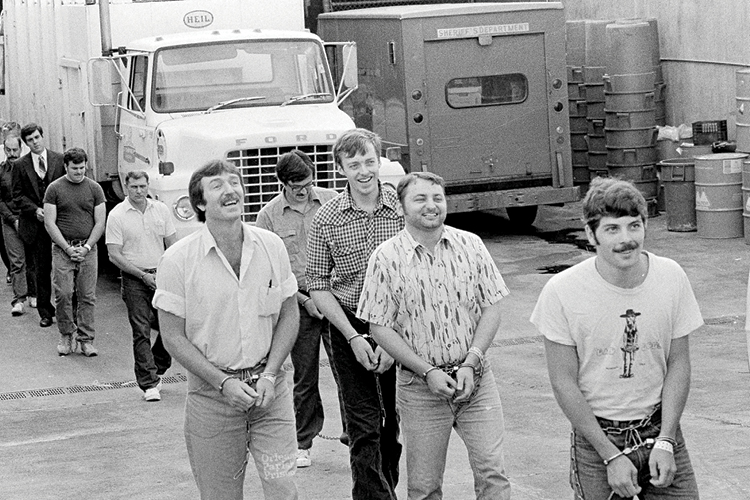June 20, 1981: Guilty verdicts in 'Bayou of Pigs' plot

"Bayou of Pigs" defendants head into court. (AP Photo/Jack Thornell)
On the night of April 27, 1981, 10 self-described mercenaries climbed aboard a truck at Fort Pike outside New Orleans. They were heading to the Mañana, a boat bound for the tiny Caribbean island of Dominica.
In a plot they dubbed Operation Red Dog, they planned to rendezvous with a few Dominican co-conspirators; arrest and/or kill Prime Minister Eugenia Charles; then replace her with the nation’s previous leader, Patrick John, ousted by scandal in 1979.
But driving the truck was a federal agent from the U.S. Bureau of Alcohol, Tobacco and Firearms. Moored at the nearby Harbor Inn Marina was the Mañana and a small army of federal agents and state police waiting in the dark.
All 10 mercenaries were arrested on charges of possessing illegal firearms and explosives as well as conspiracy to violate the Neutrality Act of 1794, a long-standing prohibition against unauthorized private citizens taking up arms against foreign nations.
The focus of the investigation was Mike Perdue, a truck driver from Houston who had used his contacts in the Ku Klux Klan to recruit a tiny army of ne’er-do-well white supremacists and neo-Nazis who had gravitated toward the plot from as nearby as rural Mississippi and as far away as Toronto.
Perdue, who presented himself as a soldier of fortune, had regaled recruits and potential investors in the venture with tales of combat experiences—as a Marine in Vietnam and a mercenary in Latin America, fighting communists for money. His plan, backed by John, was to coordinate a rebellion of locals that could easily overcome the 300-square-mile nation’s tiny, ill-equipped and untrained police force.
Operation Red Dog
The plan was well-armed with irony. Literally cribbed from the Frederick Forsyth novel The Dogs of War, Perdue’s group of white supremacists and John’s Black Revolutionary Council would join forces with local Rastafarians to fight a surge of communism in the Caribbean. Thus, Perdue intended to create a white-dominated nation on an island comprised almost entirely of indigenous Caribs and people of African descent by restoring a disgraced Black politician whose politics differed from those of Charles.
The plot had no chance to succeed. Sensing camaraderie with the captain of the Mañana, a decorated Vietnam veteran, Perdue had revealed his real purpose for the charter. The captain, Mike Howell, reported the plot to an ATF agent he knew. Thereafter, all their conversations were taped. Making matters worse, a note revealing the scheme had been discovered in Dominica, several co-conspirators had been arrested, and Dominican authorities were lying in wait. Still, Perdue plunged forward, and a contract later discovered in his briefcase revealed the reason behind his stubborn persistence: greed.
Aside from being paid $150,000 to complete the operation, a Perdue-owned company, Nortic Enterprises, was to become the exclusive agent for Dominica’s economic development. Nortic and its white supremacist investors stood to make millions from contracts for an airport, timber exports, casinos and a marijuana industry to be run by his Rastafarian co-conspirators.
But by the time the trial began, less than two months after their arrests, seven of the 10 conspirators had pleaded guilty to violating the Neutrality Act, and each was sentenced to three years. First to confess had been Perdue, who revealed he had spent only seven weeks as a Marine. Discharged for petty larceny, he had been in prison, not Vietnam. His macho mercenary adventures in Africa and Latin America, he testified, were “a fantasy of mine,” journalist Stewart Bell noted in his book about the scheme.
On June 20, 1981, a federal jury in New Orleans returned verdicts for the remaining three defendants. Stephen Don Black and Joseph Daniel Hawkins were found guilty of conspiracy and violation of the Neutrality Act. Both were longtime klansmen. The third defendant, 21-year-old klansman Mike Norris, was acquitted.
During a planning session, an investigator likened Operation Red Dog to the 1961 CIA-backed embarrassment at the Bay of Pigs. One ATF agent, struck by the stubborn stupidity of the Dominica plot, declared it no contest.
It was, he quipped, “More like the Bayou of Pigs.”
This story was originally published in the June-July 2024 issue of the ABA Journal under the headline: “June 20, 1981: Guilty verdicts in ‘Bayou of Pigs’ plot.”



